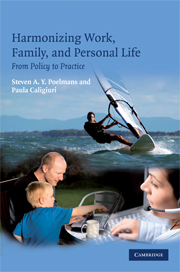Book contents
- Frontmatter
- Contents
- List of figures
- List of tables
- List of contributors
- Introduction
- Part I Describing different work–life policies, policy development, and pitfalls
- Part II Policy design, implementation, and deployment
- Part III Cultural change
- 8 Barriers to the implementation and usage of work–life policies
- 9 How to become a family-responsible firm: proposing a model for cultural change
- Epilogue: flexibility and diversity in the twenty-first century – the responsibility of human potential managers
- List of website references
- Index of subjects
- Index of authors
- References
Epilogue: flexibility and diversity in the twenty-first century – the responsibility of human potential managers
from Part III - Cultural change
Published online by Cambridge University Press: 22 September 2009
- Frontmatter
- Contents
- List of figures
- List of tables
- List of contributors
- Introduction
- Part I Describing different work–life policies, policy development, and pitfalls
- Part II Policy design, implementation, and deployment
- Part III Cultural change
- 8 Barriers to the implementation and usage of work–life policies
- 9 How to become a family-responsible firm: proposing a model for cultural change
- Epilogue: flexibility and diversity in the twenty-first century – the responsibility of human potential managers
- List of website references
- Index of subjects
- Index of authors
- References
Summary
We can compare the impact that firms will have on the social fabric of society in the twenty-first century with the impact firms had in the twentieth century on the natural environment and will continue to have in the next centuries. Firms, among the most powerful and influential institutions of our society, have the potential to transform our way of living, even our way of thinking, for the better and for the worse. They are generators of wealth and waste. The emergence of corporate social responsibility, often as a response to much of the waste created, holds the promise that company owners, executive boards, and CEOs are starting to understand the constructive and destructive power of the institutions they create.
One of the major challenges or types of waste companies will have to learn to come to terms with is stress. There is ample evidence showing how stress impacts the health and well-being of individuals, and that work-related stress is one of the major causes of strain. In the US, 43 percent of adults suffer adverse health effects from stress, and 75–90 percent of all physician office visits are for stress-related ailments and complaints. Stress is linked to the six leading causes of death: heart disease, cancer, lung ailments, accidents, cirrhosis of the liver, and suicide (American Psychological Association, 1997).
- Type
- Chapter
- Information
- Harmonizing Work, Family, and Personal LifeFrom Policy to Practice, pp. 278 - 290Publisher: Cambridge University PressPrint publication year: 2008



